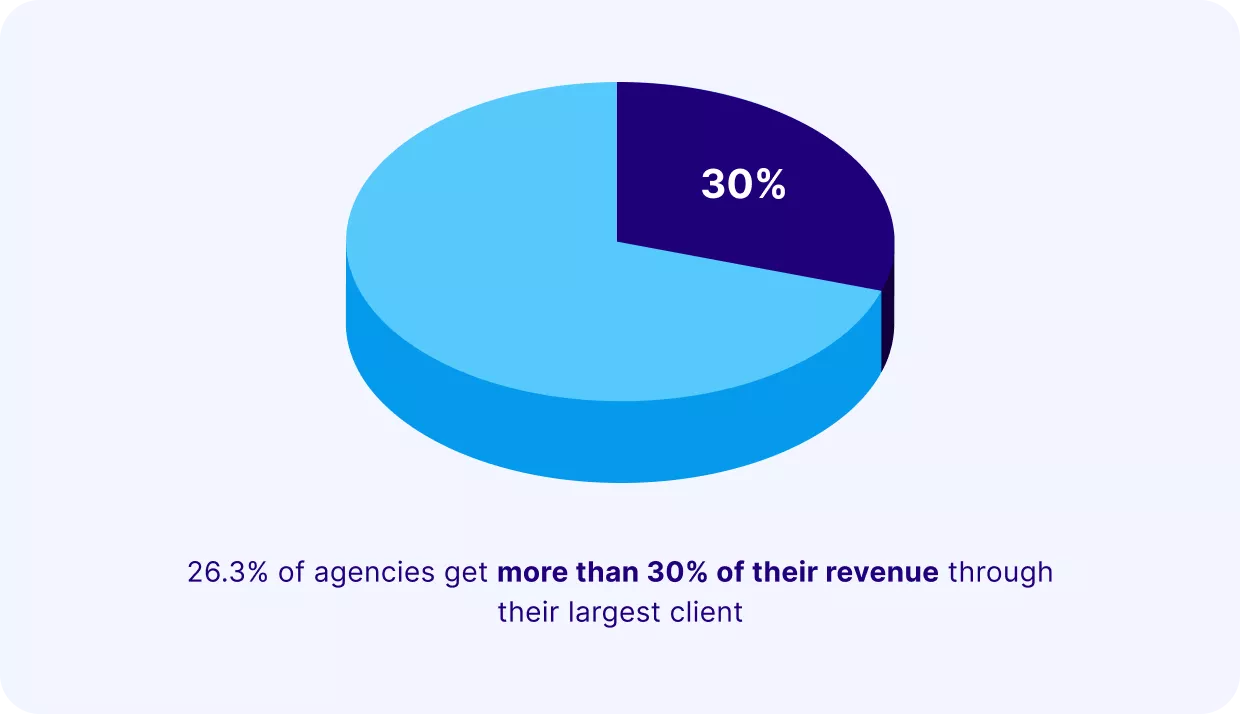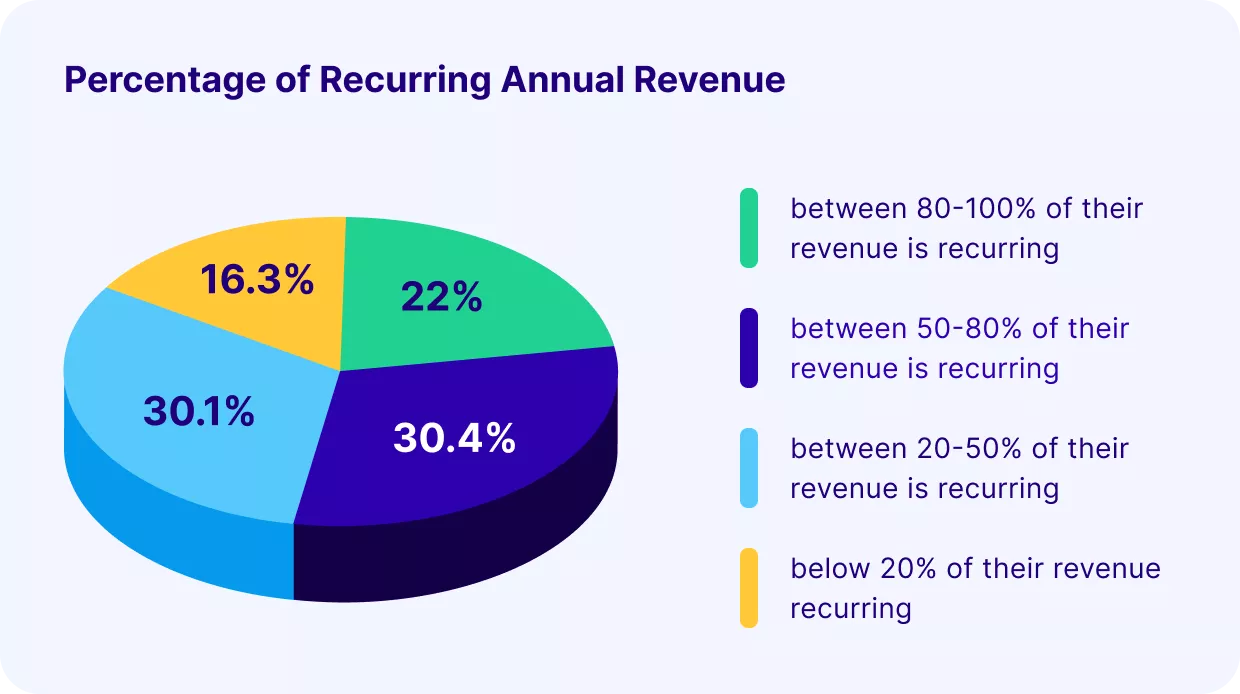AGENCY GUIDE
The 2023 Global Data Report on Agency Valuations
Introduction
When you first start building an agency, selling it is probably the last thing on your mind. But there’s a growing interest in the value that’s been created while building your agency.
There are many factors that impact your agency’s value, including revenue, EBITDA, growth rates, business development strategy, as well as management structure, and business operations tools. Gaining insights into these factors can help you get a better understanding of your business, make better investment decisions, and ultimately grow your agency.
With the help of the Agency Valuation Calculator, we gathered relevant industry data from almost 800 businesses on agency valuations. Within this report, you can find a detailed analysis of valuable statistics that will boost your understanding of agency valuations trends.
Report Background
In 2022 Productive launched a questionnaire to better understand agency merger and acquisition trends and provide insights for industry professionals on increasing the market value of their agencies.
From January to June 2023 we gathered data from a total of 796 services businesses on questions related to agency valuations. The data was gathered from a diverse range of agencies through the Agency Valuation Calculator. The subsequent report includes a detailed analysis of responses to key questions related to agency valuations.
Below, find consolidated data that was gathered through the questionnaire and insights into the factors that impact the valuations of agencies.
Size, Revenue, EBITDA, and Growth
In the world of agency valuations, size oftentimes directly correlates with EBITDA. This means that bigger agencies bring in more revenue. When looking at size, the agencies that took part in the questionnaire were segmented into four categories:

When speaking about agency revenue, respondents were divided into 2 categories: above and below $1M in revenue. Of the 796 businesses, 353 had less than $1M in revenue, while 445 agencies had more than $1M in revenue in 2022. This revenue category, combined with EBITDA (Earnings before interest, taxes, depreciation, and amortization) determined the multiplier used to value your agency. Putting it simply, the higher the earnings, the higher the multiplier.
The findings were as follows:

In terms of average annual revenue growth, in the period from 2020 to 2022, approximately 22% of the companies experienced yearly growth below 10%, while 32% of the companies reported their yearly growth being between 10 and 30%. Almost half of the respondents, around 46%, reported an average yearly growth of over 30% for the same time period.
Another thing you should keep an eye out for is client concentration. It’s the percentage of yearly revenue brought in by your largest client.
Generally speaking, anything below 25% is considered good. Why? Well, when looking at client concentration, in terms of valuations, we’re looking at risk. If your biggest client churns, how much of your yearly revenue will be lost? It’s also worth mentioning that if your biggest client is a well-known company like Google, Nike, or Microsoft, your agency’s value will go up.
Around 26% of the companies that took part in the survey reported that more than 30% of their yearly revenue comes from their largest client.

In terms of revenue, we’re also looking at how much of an agency’s revenue is recurring. More than half of the agencies that participated in the survey reported that 50% or more of their revenue is recurring, while only 16.3% reported that recurring revenue accounts for less than 20% of their overall revenue. Recurring revenue is more appealing to buyers and investors because it provides them with a certain level of certainty in regard to the business they’re acquiring.

BizDev and Management Robustness
When considering acquisition, buyers want to know how your agency will operate once it’s sold. This means that having a business development strategy is highly recommended as it will positively impact your valuation. Documented workflows and processes are also a big plus for your agency, since they showcase well-structured operations.
When agencies were asked to rate how sophisticated their business development strategy is, the findings showed that most businesses had a BD strategy in place, but still relied on their founders to some extent.

When selling or buying an agency, an important element for the further success of the business is the extent to which the management team will continue to be involved in the company after it’s sold.
When asked to rate at what level their owners are involved in their company’s management, almost 80% of respondents said that they have a certain level of management in place, but a large part is still heavily founder-reliant.
In giving an approximation of how long their transition plan would last should their agencies be sold, around half stated that their owners would likely stay in the company for 12-24 months, while 23.2% said that would depend on post-transaction opportunities. Around 10% of agency owners said they don’t plan on staying during the transition period.
Reputation and Brand Image
Having a well-reputed agency will surely increase its value, but getting there might be a bit trickier than you’d expect. When talking about reputation, a single issue arises: there isn’t a single way to quantify it.
We decided to ask agencies to give an estimate of how well-known they think they are. Most of the agencies, about 70%, were either only locally known or at least somewhat known on the global market. Around 16.5% of agencies said they don’t invest in branding efforts and rely on word of mouth. The remaining agencies said they have a great global reputation.
Your reputation should scale alongside your agency as you grow. Pick and choose the brand-related activities you want to work on based on the growth phase your agency is currently in.
Data Consolidation and Ops Tools
One of the most interesting findings of the study is that on average, less than half of the agencies use an integrated platform that consolidates all of their business data.
Out of the top-performing agencies who filled out the questionnaire, 37.5% with revenue below $1M USD and 47.6% with revenue over $1M USD use an agency management system that integrates all of their business data.
The consolidation of business data is key for successful agency management. By effectively harnessing business data, agencies can optimize their operations, efficiently manage resources, and accurately forecast future trends.
In order to achieve higher scores in agency valuations and fully capitalize on opportunities for mergers and acquisitions, it’s crucial to undertake this essential step. Try Productive for end-to-end agency business management.
The Dos and the Don’ts
Learning from mistakes is a crucial part of any development, be it personal or professional. Whilst analyzing the gathered data, we came across common mistakes that agencies tend to make. But don’t worry, we also have some recommendations on how to fix them.

How Agencies With the Best Valuations Are Performing
We’ve explained the importance of KPI monitoring, business strategies, management robustness, and business operation tools in detail, but we also want to show you how the agencies with the best valuations are performing.
We consolidated data for the top 5% of agencies, for both agencies with less than $1M USD yearly revenue and those with more than $1M USD yearly revenue. This will make it easier to compare your own performance to other market leaders.
The top 5% of agencies with revenue above $1M show high profitability, fast growth, and low client concentration. Additionally, almost 50% of these agencies use an agency management system that integrates their business data.

There are a few obvious differences between the top agencies in the above $1 M category and those in the below $1 M revenue category.
While agencies in both categories display high profitability and fast growth, the top agencies with revenue below $1 M are more reliant on founders in terms of Business Development, since many of them don’t have a real BD strategy in place. They also tend to use many different tools that don’t integrate their business data into one platform.

Takeaways
- Size and Revenue: Bigger agencies generally equate to more revenue. In 2022, the majority of agencies surveyed had over $1M USD in revenue.
- Growth and Client Concentration: About 46% of agencies experienced a yearly growth rate of over 30% from 2020-2022. However, dependency on a single client for a significant portion of revenue can be risky. Ideally, an agency’s largest client should bring in less than 25% of yearly revenue to minimize risk.
- Recurring Revenue: Over half of the agencies reported that more than 50% of their revenue is recurring, which gives potential buyers a sense of stability.
- Management and Transition: A solid business development strategy boosts valuations, but many agencies still rely on founders. After a potential sale, around half of agency owners foresee staying with their company for the next 12-24 months.
- Reputation: While it’s hard to quantify, a strong reputation is invaluable. Building an agency’s brand requires patience and targeted efforts that align with the agency’s growth phase.
- Data Consolidation: Less than half of the surveyed agencies use an integrated platform to consolidate business data. This integration can help optimize operations and improve future forecasts.
- Comparative Analysis of Top Performers: Top-performing agencies, especially those with revenues exceeding $1M USD, showed high profitability, rapid growth, and low client concentration. Notably, about 50% of these agencies integrate their business data using an agency management system.
Try the Agency Valuation Calculator Today
Whether you’re thinking about selling or just for curiosity’s sake, knowing your agency’s value can help you in the long run.
Try the Agency Valuation Calculator to learn what influences the total value of your agency, plus how you can increase it.
Achieve Your Agency’s
True Potential
Switch from multiple tools and spreadsheets to one scalable agency management system.